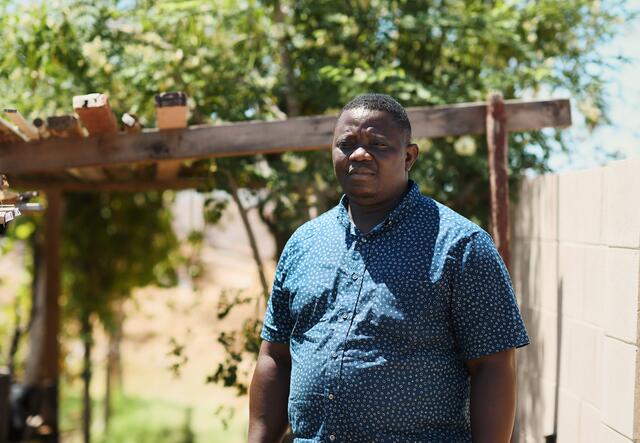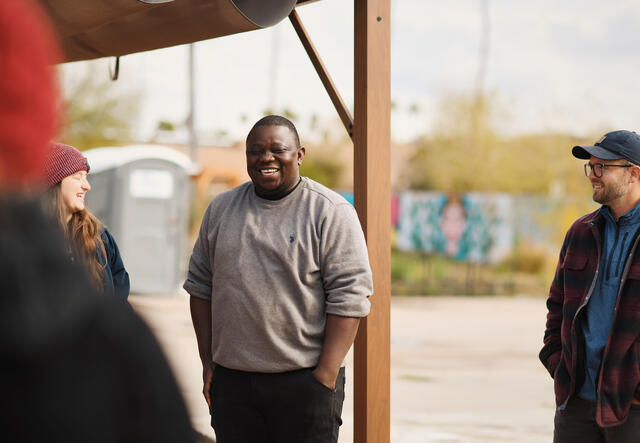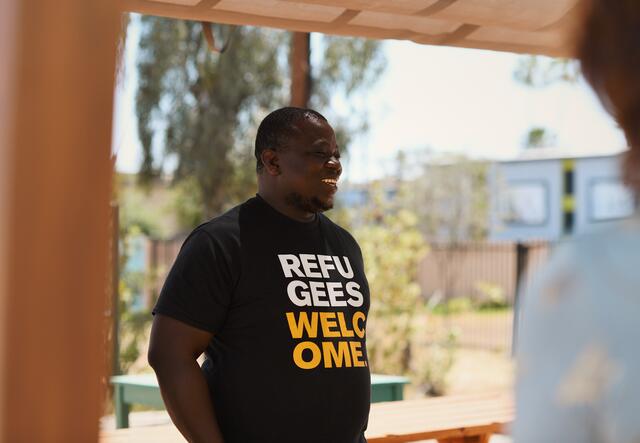
Written by: Nisha Datt, Communications Coordinator
A country torn by conflict
Born and raised in the small city of Voinjama, Liberia, Marcus was the youngest of four children. He was eight years old when the first civil war, to overthrow the government in Liberia, began in December of 1989. Over 300,000 Liberians were forced to flee and seek refuge in neighboring countries (via. UNHCR). “The war had intensified, and we had to leave town and go into the bush [in the forest] to find refuge, because the rebel [groups] would invade the villages and kill people,” Marcus recalled.
Liberia was established in the early 1820s by the American Colonization Society (ACS) and named Monrovia, after ACS member and American President James Monroe. The land was founded as a place of resettlement for “Americo-Liberians,” freeborn and formerly enslaved African Americans who immigrated to Liberia in the 19th century. In 1847, Liberia declared its independence making it Africa’s oldest Republic, naming Monrovia its capital (via. PBS).
Over a century later, deep-rooted corruption and totalitarianism conquered the nation resulting in civil unrest across Liberia. To escape the First Liberian Civil War, Marcus and his father hid in the forest for one year until they sought safety in a refugee camp in Guinea in 1993. They lived in the camp for a few years where they were introduced to the International Rescue Committee (IRC). “The IRC was the only organization providing education support to refugees in Guinea,” he shared. He attended classes every day for the three years not just to learn but to enjoy a free meal. “What kept me in school was the IRC had a program where they provided meals for school-going children everyday – I would go to school every day just to make sure I had something to eat,” he said, as he let out an innocent laugh.
Shifting focus
In 1997, a new president, Charles Taylor, was elected in Liberia and the conflict ended. Not knowing what the future had in store, Marcus moved back to his hometown in Voinjama. Two years later, the second civil war began. “That pushed me to Monrovia, the capital city of Liberia in 1999 where I completed my high school education,” he shared. When the war finally ended in 2003, Marcus applied for a scholarship intended for youth affected by the war. He shared his story of experiencing loss when his older brothers were killed during the war. “That financial aid was given to me to go to university… I went to Cuttington University, in Liberia, and received a first degree in Agriculture,” he shared.
Over 70% of Liberia’s population relies on agriculture to support their families (via. UNDP). Marcus’ father was a farmer. “Farming was a way of life,” he said. “There was always an issue of hunger back in Liberia and West Africa as a whole. I felt that’s one area where I could actually gain skills to support people whose lives have been affected by hunger,” Marcus added.
Continuing to pursue higher education, Marcus went on to get his Master’s degree in Agronomy, in Sierra Leone – “it’s a bunch of agriculture that deals with soil management and crop production,” he explained. It was in Sierra Leone, where he met his wife. “I had gone out to a beauty pageant on the eve of Christmas in 2010 and then met this pretty girl.” After receiving his degree, he began working at the National Agriculture Research Systems (NARS) where he was later offered a scholarship to conduct research, which took him to Ghana. “I took advantage of that scholarship, and I went to the University of Cape Coast,” he said. In 2016, Marcus received his PHD in Crop Science.

The beginning of something new
Six years later, Marcus applied for a Diversity Visa for himself, his wife and their son through the United States’ Diversity Visa program. “[We] won the diversity lottery and moved to the U.S. in September 2022 – we came to Indiana.” In his search for opportunities to put his extensive knowledge of agriculture to use, he learned that the IRC has different programs, apart from educational support, to help refugees. “I went on the website one day, a job website, and saw that the IRC was providing support to refugees, asylum-seekers, and people whose lives have been affected by conflict and disaster,”he expressed.
In January of this year, Marcus made the move to Phoenix, Arizona to join our New Roots team as the New Roots Farm Coordinator. “I manage the day-to-day activity of the farm site… I work with clients, the refugee farmers, whose livelihoods have been based on agriculture from where they come from,” he explained. While the work he is doing in this role isn’t new to him, he is always learning from his team. Driven by the impact of his work, Marcus beams with pride to be working at the IRC. “I am happy to be on a team that supports so much and has friendly people where you are not marginalized because of anything – you are given a space to share your experience,” he shared.
Healthy soils leads to nutritious produce
The IRC in Phoenix’s New Roots program aims to support refugee farmers on their path to becoming self-sufficient through community gardening, nutrition education and small business farming. By providing the land and resources, clients are able to develop new skills and grow healthy produce for their household or to sell in local markets. Despite knowledge discrepancies among participants, who have worked different types of land in different countries, Marcus emphasized the importance of building a strong foundation – the soil. “If the soil is not healthy, the plant won’t be healthy – plant nutrition depends on how healthy your soil is.” Apart from understanding the basics of farming, having a clear goal is equally important. “You want to first think of why you want to grow, maybe you are growing to sell or for food security... if you are planning for the market, you want to make sure the crops are in demand,” he explained.
Just getting started
Having been in his role for six months now, Marcus has hit the ground running. From developing strong relationships with refugee farmers to working on grant proposals for the program, he is making the most of his time. “My goal is to be with the IRC for a long time. Beyond Arizona, I hope to work all over the world – I believe in working anywhere where I can make an impact,” he expressed.

